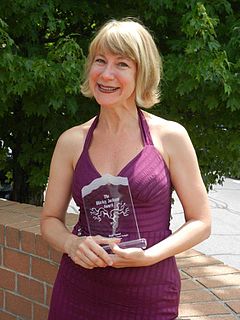A Quote by Mel Brooks
My mother is very short - four-eleven. She could walk under tables and never hit her head.
Related Quotes
One thing I did have under my belt was, my mother lost her mother when she was 11. She mourned her mother her whole life and made my grandmother seem present even though I never met her. I couldn't imagine how my mom could go on but she did, she took care of us, she worked two jobs and had four children. She was such a good example of how to conduct oneself in a time of grief. When I lost my husband, I tried to model myself as much as I could on her.
She stared at herself in the mirror. Her eyes were dark, almost black, filled with pain. She'd let someone do that to her. She'd known all along she felt things too deeply. She became attached. She didn't want a lover who could walk away from her, because she could never do that - love someone completely and survive intact if her left her.
If she'd spaced her children out and had eleven babies in eleven years, she would have been no better than her own mother and sisters: irresponsible, a welfare cheat, another bit of Sawdust Lane white trash. But as luck would have it, she'd had them all at once, and now she was, overnight, middle-class. And respectable.
I begged her, 'Please don't leave me stranded in the middle of some primitive zarking forest with no medical help and a head injury. I could be in serious trouble and so could she.'" "What did she say?" "She hit me on the head with the rock again," Ford responded curtly. "I think i can confirm that was my daughter." "Sweet kid." "You have to get to know her," said Arthur. "She eases up, does she?" "No, but you get a better sense of when to duck.
Lady Maccon stopped suddenly. Her husband got four long strides ahead before he realized she had paused. She was starring thoughtfully up into the aether, twirling the deadly parasol about her head. "I have just remembered something," Alexia said when he returned to her side. "Oh, that explains everything. How foolish of me to think you could walk and remember at the same time.
My youngest sister, Cindy, has Down syndrome, and I remember my mother spending hours and hours with her, teaching her to tie her shoelaces on her own, drilling multiplication tables with Cindy, practicing piano every day with her. No one expected Cindy to get a Ph.D.! But my mom wanted her to be the best she could be, within her limits.
I think that, very often there's a pain that's just too painful to touch. You'll break apart. And I think her mother's death and disappearance and abandonment was something she just never could deal with. Eleanor Roosevelt, when she's really very unwell in 1936, she takes to her bed. She has a mysterious flu.
I mean, her father was an alcoholic, and her mother was the suffering wife of a man who she could never predict what he would do, where he would be, who he would be. And it's sort of interesting because Eleanor Roosevelt never writes about her mother's agony. She only writes about her father's agony. But her whole life is dedicated to making it better for people in the kind of need and pain and anguish that her mother was in.
My daughter lives in an apartment (hovel) in Brooklyn, so disgusting the roaches don't even bother hiking up the four flights of stairs to her door. Did I mention that she has a family of mice living under her stove? If she would promise to carry a weapon in her bag, I would never ask her to visit again. Best Mother's Day gift I could ask for!
A lot of people say that Eleanor Roosevelt wasn't a good mother. And there are two pieces to that story. One is, when they were very young, she was not a good mother. She was an unhappy mother. She was an unhappy wife. She had never known what it was to be a good mother. She didn't have a good mother of her own. And so there's a kind of parenting that doesn't happen.
At the very last moment, just before its lips claimed hers, its grip on her face relaxed slightly and she did the only thing she could think of: She head-butted it. Snapped her head back, then forward again, and bashed it square in the face as hard as she could. So hard, in fact, that it made her woozy and gave her an instant migraine, making her wonder how Jean-Claude Van Damme always managed to coolly continue fighting after such a stunt. Obviously, movies lied.
That one woman is both mother and virgin, not in spirit only but even in body. In spirit she is mother, not of our head, who is our Savior himself-of whom all, even she herself, are rightly called children of the bridegroom-but plainly she is the mother of us who are his members, because by love she has cooperated so that the faithful, who are the members of that head, might be born in the Church. In body, indeed, she is the Mother of that very head.
































